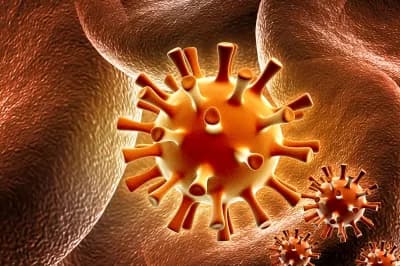
Inherited Herpesvirus Study Finds Links To Ancient Humans
An international study of integrated HHV-6 has discovered that a small number of human ancestors, one from about 24,000 years ago, have been responsible for transmitting ancient strains of the virus to individuals today -- affecting about a million people in the UK alone.
Research led by the University of Leicester collected DNA samples from unrelated people who were carriers of the human herpesvirus 6, mostly from the UK and Europe but also from Japan, China and Pakistan. The researchers found that some of the inherited HHV-6 genomes are very similar to each other and are also located in the same chromosome in people having no known family relationship. This showed that the HHV-6 genomes, which the scientists sequenced, originated in a small number of ancestors thousands of years ago.
The researchers also found that most of the inherited HHV-6 genomes are intact and therefore may be able to reactivate as viruses. The study makes an important contribution towards understanding the possible impact of inherited HHV-6 on the 1-2% of the UK population who carry it.
Dr Nicola Royle of the Department of Genetics and Genome Biology at the University of Leicester, who headed the study, said: "There are two types of HHV-6 (HHV-6A and HHV-6B) that have different biological, immunological, pathological and molecular properties.
"Initial infection by HHV-6 usually occurs in early childhood. Then, like most herpesviruses, HHV-6 enters a state of latency and persists for life in a small number of cells. Reactivation of latent HHV-6 can have severe consequences and often occurs in patients with a compromised immune system, for example in patients undergoing chemotherapy or haematopoietic stem cell (HSC) therapy, in particular when the stem cells are from cord blood.
"Unexpectedly, about 1-2% of the UK population (650,000 -1.3 million people) have inherited a copy of the human herpesvirus 6 genome as if it is part of their own human genome. The inherited HHV-6 genome is large, containing at least 86 viral genes, and is carried in a telomere. Telomeres are the essential capping structure at the ends of chromosomes that stablise the human genome and play important roles in cancer and ageing. Carriers of integrated HHV-6 bear one copy of the viral genome per cell and therefore have a high load of viral DNA. There has been very little research into the consequences for people who have inherited HHV-6, although a recent Canadian study has shown they have an increased risk of suffering from angina pectoris.
"We used molecular dating methods to compare, for example, the inherited HHV-6B genomes in five individuals from Sardinia, Orkney and England, and estimated that the most recent common ancestor with the inherited HHV-6B existed 24,500 ±10,600 years ago. Despite the antiquity of this inherited HHV-6B genome, it is intact and therefore potentially functional in all five carriers.
"We want to find out whether integrated HHV-6 carriers have an increased risk of disease or other adverse effects, and, if so, how this might be manifested. We think that there are three ways in which the inherited HHV-6 genome could have a deleterious effect:
- The presence of the HHV-6 genome could compromise the function of the telomere in which it is integrated or affect the expression of nearby human genes
- HHV-6 genes could be expressed from time to time over the carrier's lifetime and elicit an adverse immune response
- the inherited HHV-6 genome could potentially reactivate and generate viable viruses.
"Our new research makes an important contribution towards understanding the possible impact of inherited HHV-6 on people that carry it. We now know that in Europe, and most likely in other populations as well, most inherited HHV-6 genomes have been inherited from a small number of ancestors thousands of years ago and still appear to have the potential to reactivate."
Stratification of carriers of inherited HHV-6 in modern populations due to common ancestry is an important consideration for genome-wide association studies that aim to identify disease risks for carriers. In addition the discoveries represent potentially important considerations for immune-compromised patients, in particular in the setting of organ transplantation and in stem cell therapy.
The work, published in the Journal of Virology, was carried out by staff and students in the Telomere Group, headed by Dr Nicola Royle in the Department of Genetics at the University of Leicester in collaboration with Prof. Andrew Davison and Prof. Ruth Jarrett and their teams in the MRC-University of Glasgow Centre for Virus Research.
Materials provided by University of Leicester. Note: Content may be edited for style and length.
Disclaimer: DoveMed is not responsible for the accuracy of the adapted version of news releases posted to DoveMed by contributing universities and institutions.
References:
Enjie Zhang, Adam J Bell, Gavin S Wilkie, Nicolás M Suárez, Chiara Batini, Colin D Veal, Isaac Armendáriz-Castillo, Rita Neumann, Victoria E Cotton, Yan Huang, David J Porteous, Ruth F Jarrett, Andrew J Davison, Nicola J Royle. (2017). Inherited chromosomally integrated human herpesvirus 6 genomes are ancient, intact and potentially able to reactivate from telomeres. Journal of Virology. DOI: 10.1128/JVI.01137-17
Related Articles
Test Your Knowledge
Asked by users
Related Centers
Related Specialties
Related Physicians
Related Procedures
Related Resources
Join DoveHubs
and connect with fellow professionals

0 Comments
Please log in to post a comment.